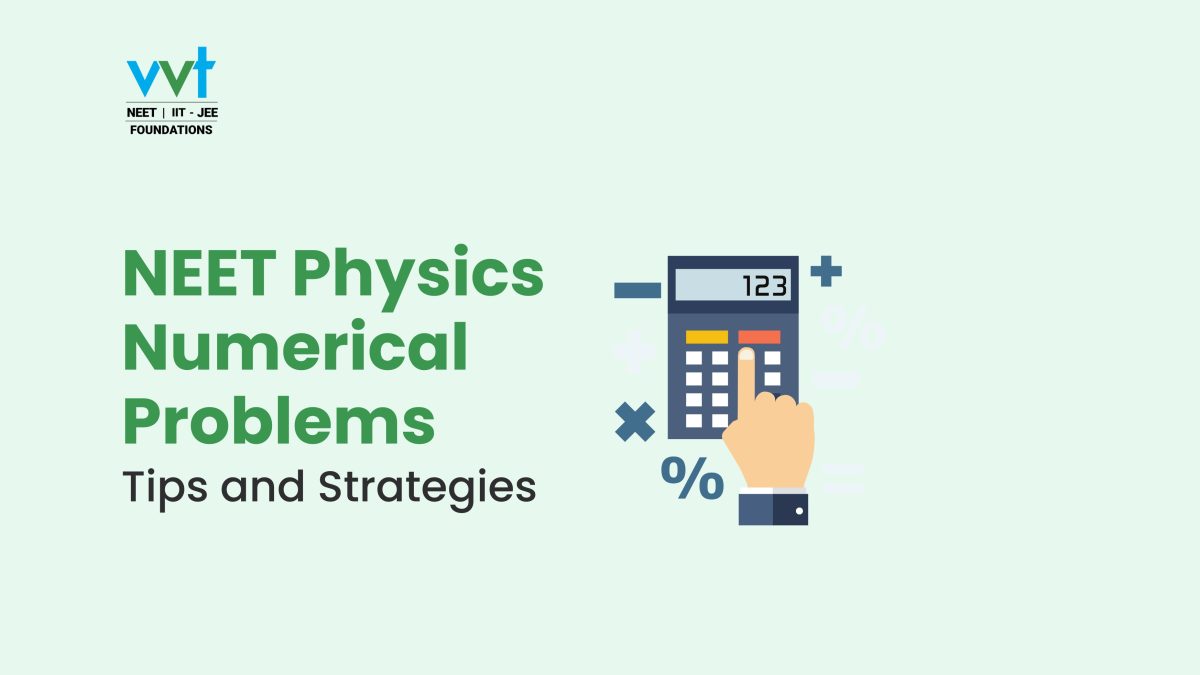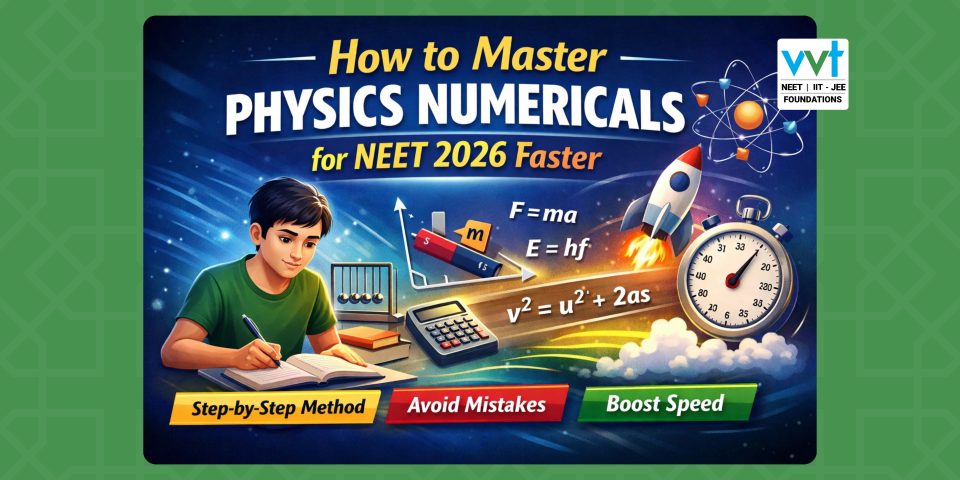
Respiration in Plants – NEET 2025 Notes | VVT Coaching
April 16, 2025
5 Critical Mistakes in NEET Chemistry MCQs and How to Avoid Them | VVT Coaching
April 18, 2025Tips and Strategies for Mastering Numerical Problems in NEET Physics | VVT Coaching
VVT Coaching Chennai – Ranked #1 Best NEET Coaching Centre by Times Now!
Physics can feel like a daunting hurdle in the NEET exam, especially when it comes to numerical problems. These questions test not just your knowledge but your ability to apply concepts under time pressure. However, with the right strategies, you can turn numericals into a strength. At VVT Coaching we’re dedicated to empowering NEET 2025 aspirants with clear, exam-focused resources. This guide offers practical tips and strategies to help you master numerical problems in NEET Physics, covering key topics like mechanics, thermodynamics, and electromagnetism. Let’s unlock your potential and make physics a scoring section!
Why Numerical Problems Are Crucial for NEET Physics
Numerical problems are a significant part of the NEET Physics section, which carries 180 marks out of the total 720. These questions often require you to apply formulas, analyze data, and perform calculations, testing both conceptual understanding and problem-solving skills. They frequently appear in high-weightage topics such as:
- Mechanics (motion, work, energy, momentum)
- Thermodynamics (heat, work, entropy)
- Electromagnetism (circuits, magnetic fields)
- Optics (lenses, mirrors, wave optics)
Excelling in numericals can boost your overall score and build confidence for tackling other sections like chemistry and biology. With the right approach, you can transform these challenges into opportunities.
Effective Strategies for Solving Numerical Problems
1. Build a Strong Conceptual Foundation
Understanding the underlying physics concepts is the first step to solving numerical problems. Without clarity, you may misapply formulas or misinterpret questions.
- How to do it:
- Study NCERT textbooks thoroughly to grasp core concepts.
- Use visual aids like diagrams to understand forces, fields, or energy transfers.
- Relate concepts to real-world examples (e.g., a falling object for kinematics).
2. Practice with Purpose
Regular practice is key to mastering numericals. It helps you recognize patterns, improve speed, and reduce errors.
- How to do it:
- Solve problems from NCERT examples and previous NEET papers.
- Practice a mix of easy, moderate, and complex problems to build versatility.
- Focus on multi-concept questions that combine topics like work-energy and kinematics.
3. Break Down Complex Problems
Numerical problems can seem overwhelming, but breaking them into smaller steps makes them manageable.
- How to do it:
- Identify the given data (e.g., mass, velocity, time).
- Determine what the question asks for (e.g., distance, energy).
- Select the appropriate concept or formula and solve it systematically.
- Verify your answer by checking units or reworking the problem.
4. Avoid Common Pitfalls
Small mistakes can cost valuable marks. Being aware of common errors helps you stay vigilant.
- Common mistakes:
- Forgetting to convert units (e.g., km/h to m/s).
- Misinterpreting terms (e.g., distance vs. displacement).
- Ignoring sign conventions (e.g., positive/negative directions in kinematics).
- Applying the wrong formula for the context.
5. Master Time Management
NEET is a time-bound exam, and numericals can be time-consuming. Efficient time management ensures you maximize your score.
- How to do it:
- Practice solving problems under timed conditions to simulate exam pressure.
- Prioritize easier numericals to secure quick marks.
- If stuck, move on and return later to avoid wasting time.
6. Use Dimensional Analysis
Checking the dimensions of your answer ensures it’s physically meaningful.
- How to do it:
- Verify that the units on both sides of an equation match.
- Example: For velocity, ensure the answer is in meters per second (m/s).
Topic-Specific Tips for Numerical Problems
1. Mechanics
- Focus Areas: Kinematics, dynamics, work-energy theorem, and momentum.
- Tips:
- Understand vector components for motion problems.
- Practice projectile motion and relative velocity questions.
- Note: Horizontal velocity is constant in projectile motion (no air resistance).
2. Thermodynamics
- Focus Areas: Laws of thermodynamics, heat engines, and entropy.
- Tips:
- Clarify the difference between heat and work.
- Practice problems on efficiency and Carnot cycles.
- Key concept: Energy conservation applies to all thermodynamic processes.
3. Electromagnetism
- Focus Areas: Circuits, magnetic fields, and electromagnetic induction.
- Tips:
- Master series and parallel circuit calculations.
- Practice problems on Faraday’s law and Lenz’s law.
- Key concept: Use Kirchhoff’s laws for complex circuits.
4. Optics
- Focus Areas: Ray optics, wave optics, and optical instruments.
- Tips:
- Draw ray diagrams for lenses and mirrors to visualize problems.
- Practice refraction and interference questions.
- Key concept: Sign conventions are critical for lens and mirror formulas.
Strategies Table
| Strategy | Description |
| Conceptual Clarity | Study NCERT to understand the theory behind each problem. |
| Regular Practice | Solve diverse problems from past papers and examples to build confidence. |
| Problem Breakdown | Identify given data, select concepts, and solve step-by-step. |
| Error Avoidance | Check units, sign conventions, and formula applicability to minimize mistakes. |
| Time Management | Practice under timed conditions and prioritize easier problems. |
| Dimensional Analysis | Verify units to ensure answers are physically meaningful. |
Conclusion
Numerical problems in NEET Physics may seem challenging, but with the right strategies, they can become your strength. By building a strong conceptual foundation, practicing regularly, and managing time effectively, you can tackle these questions with confidence.
Let our experienced team guide you toward a fulfilling future in healthcare. Join VVT Coaching today and take the first step toward your medical career!
Also check:
- Total MBBS Seats in India for NEET 2025
- Understanding Allotment Mapping in NEET Counselling
- Minimum Marks Required in NEET 2025 for MBBS
- Understanding Allotment Mapping in NEET Counselling
FAQs on Mastering Numerical Problems in NEET Physics
- How can I improve my speed in solving numerical problems?
Regular practice with timed mock tests helps build speed. Focus on understanding concepts to avoid guesswork. - Which physics topics have the most numerical problems in NEET?
Mechanics, thermodynamics, and electromagnetism are high-weightage topics with frequent numericals. - What should I do if I get stuck on a numerical problem?
Break it into smaller steps, check for missing data, and move on if it takes too long, returning later if time permits. - How can I avoid calculation errors?
Double-check units, use dimensional analysis, and practice mental math to reduce errors. - Are NCERT books enough for numerical problems?
NCERT is essential for concepts, but supplement with past papers and practice books for variety. - How does VVT Coaching help with numerical problems?
VVT Coaching provides expert notes, practice questions, and PDFs tailored to NEET’s numerical focus.











